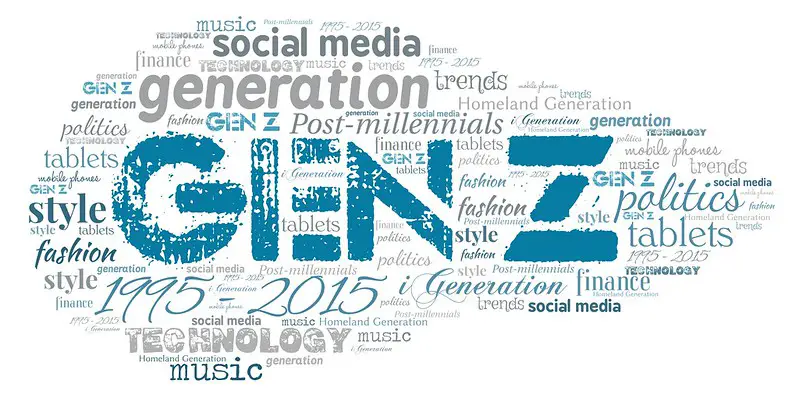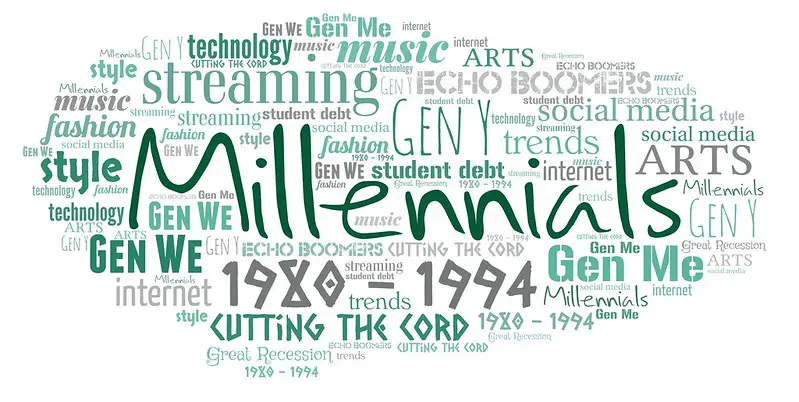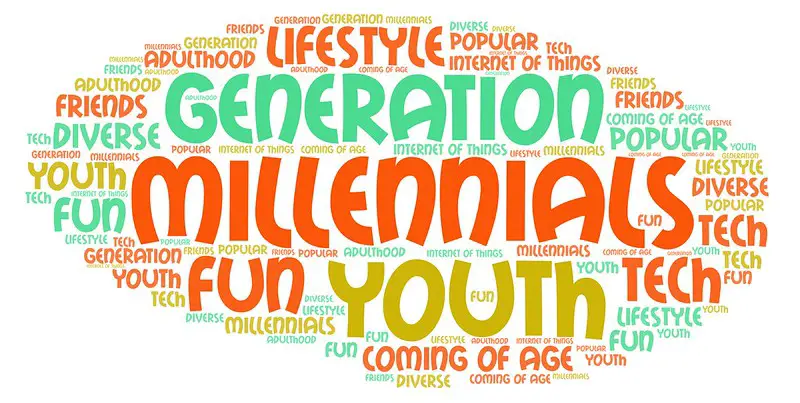Millennials are typically defined as the generation born between 1981 and 1996, while Gen Z refers to the generation born between 1997 and the mid-2010s. These two generations differ in a number of ways, including their experiences with technology, their attitudes toward social and political issues, and their overall worldview. Gen z’s are considered much more diverse than millennials. They’re also more likely to be digital natives, meaning they’ve grown up with technology. Gen z is also more likely to be entrepreneurial than millennials.
The Differences Between Millennials and Gen Z
(Picture by EpicTop10.com on Flickr)

There are a few key ways that Generation Z (born in 1996 and after) differs from Millennials (born 1981-1995). First, Gen Z is the most racially and ethnically diverse generation in history. They are also digital natives—the first generation to grow up with the internet. Gen Z is also more entrepreneurial than any previous generation—a trait that has been attributed to their exposure to technology. Gen Z is often described as being more tolerant and accepting of others than their Millennial predecessors. This may be due in part to the fact that they are growing up in a more globalized world.
Millennials are more likely to be engaged in social and political issues, while gen z is more focused on entertainment and pop culture. Gen z is also more likely to be entrepreneurial, with a greater interest in start-ups and small businesses.
The Similarities Between Millennials and Gen Z
(Picture by EpicTop10.com on Flickr)

Millennials and Gen Z share some similarities, particularly in terms of their cultural experiences and attitudes. Both generations grew up in a time of rapid technological change, with access to the internet, smartphones, and social media. This has made them more digitally savvy than previous generations and has shaped their attitudes toward technology and communication. Additionally, both generations are generally more progressive and liberal in their social and political views than previous generations. They tend to be more accepting of diversity and inclusivity, and more willing to challenge traditional societal norms and institutions. Finally, both generations have been shaped by major world events, such as the 9/11 terrorist attacks and the global financial crisis, which have had a significant impact on their worldview and life experiences. Despite some differences in their age and cultural experiences, Millennials and Gen Z have much in common and are likely to continue shaping the social and political landscape for years to come.
The Different Stereotypes of Millennials and Gen Z
There are a few different stereotypes of millennials and Gen Z. The first is that millennials are lazy, entitled, and narcissistic. The second is that Gen Z is lazy, entitled, and narcissistic. The third is that millennials are tech-savvy and always plugged in, while Gen Z is addicted to social media. And the fourth is that both groups are social justice warriors who are always fighting for causes.
The truth is, there are some differences between millennials and Gen Z. For one, millennials are more likely to be employed full-time than Gen Z. Millennials also have more debt, due to the fact that they’re more likely to have gone to college. And while both groups are considered liberal,millennials tend to be more progressive than Gen Z.
But at the end of the day, both groups are just people. There’s no one-size-fits-all description of either group. So don’t believe everything you read about them – including this article!
What are the Advantages and disadvantages of being a Gen Z?
There are advantages and disadvantages to being a part of any generation, and Gen Z is no different. One advantage of being a Gen Z-er is that you are part of a generation that is more racially and ethnically diverse than any previous generation. In the United States, for example, 43% of Gen Z-ers are non-Hispanic white, while 54% are millennials. This diversity is reflective of the changing demographics of the country as a whole, and it means that Gen Z-ers are better prepared to live and work in a multicultural world.
Another advantage of being a Gen Z-er is that you grew up with technology. You are the first generation to never have known a world without the internet, and you are comfortable with using new technologies. This gives you an edge in our increasingly digital economy, where jobs that require tech skills are growing faster than those that don’t.
Of course, there are also some disadvantages to being part of Generation Z. One disadvantage is that you are coming of age during a time of economic uncertainty. The Great Recession hit just as many of you were entering the workforce, and many of you have faced challenges like high levels of student debt and difficulty finding good jobs. In addition, because you grew up with technology, you may be more prone to developing addictions to things like social media or gaming. And finally, because you are such a large generation (there are more than 60 million Gen Z-ers in the
What are the Advantages and disadvantages of being a Millennial?
As with any generation, being a Millennial has both advantages and disadvantages. On the positive side, Millennials are often tech-savvy and comfortable with a wide range of digital devices and platforms. This can give them an edge in the job market, as many industries are increasingly relying on technology and digital communication. Additionally, Millennials are generally highly educated and more likely to have a college degree than previous generations. This can lead to greater earning potential and job security.
However, Millennials also face some challenges. They have come of age during a time of economic uncertainty and are often burdened by high levels of student loan debt and a difficult job market. This can make it harder for them to achieve financial stability and security. Additionally, Millennials have been criticized for being entitled or self-centered, although these criticisms may not be entirely fair. Finally, Millennials have grown up in a time of political polarization and social division, which can be a source of stress and anxiety.
What makes Gen Z so different?
Gen Z is the most diverse generation in history. According to Pew Research Center, 56% of Gen Zers are part of a minority race or ethnic group. What’s more, they are also the most educated generation: A whopping 36% of Gen Z’s have completed some college, compared to just 29% of millennials.
This generation is also more entrepreneurial than any other: In 2018, 72% of Gen Z’s said they wanted to start their own business someday, compared to 60% of millennials. And they’re already making waves in the business world: In 2017, nearly one-third of 18-to-21-year-olds said they were already earning money from their own businesses.
Finally, Gen Z is the first true digital natives. They’ve never known a world without the internet or smartphones – and that has had a big impact on how they communicate and interact with the world around them.
What are typical qualities of Millennials and gen z’s?
| QUALITIES | BRIEF DESCRIPTION |
|---|---|
| Tech-savvy | Comfortable with and adept at using digital technologies |
| Socially aware | Passionate about social and political issues such as climate change and social justice |
| Open-minded | Willing to consider new and different ideas and perspectives |
| Entrepreneurial | Driven to create and innovate in business and beyond |
| Collaborative | Tend to value working in teams and collaborating with others |
| Value work-life balance | Prioritize achieving a healthy balance between work and personal life |
| Desire flexibility in work | Seek out flexible work arrangements and may prioritize work that allows them to maintain autonomy |
| Environmental consciousness | Consciously seek out ways to minimize their environmental impact and prioritize sustainability |
| Desire for social impact | Motivated to make a positive difference in the world |
What are Gen Z biggest problems?
Like any generation, Gen Z faces a number of challenges and problems as they navigate the world. One of the biggest issues for Gen Z is the impact of social media and digital technologies on their mental health and well-being. Many young people in this generation feel pressure to maintain a constant online presence and compare themselves to others on social media, leading to feelings of anxiety and low self-esteem. Additionally, cyberbullying and online harassment are significant problems for many Gen Zs.
Another major issue for Gen Z is the economic uncertainty and inequality that they are facing. Many young people in this generation are struggling with student loan debt and a difficult job market, and they face the prospect of being the first generation to have a lower standard of living than their parents. This can lead to feelings of hopelessness and frustration.
Finally, Gen Zs are also grappling with a range of social and political issues, including climate change, racial and gender inequality, and gun violence. Many young people in this generation are passionate about these issues and are speaking out and taking action, but they also face pushback and resistance from those who disagree with their perspectives.
What are Millennials biggest problems?
There are a number of problems that millennials face that other generations may not have had to contend with to the same extent. One such problem is student loan debt. According to a study by Forbes, the average millennial graduate has around $37,000 in student loan debt. This can make it difficult to buy a home or save for retirement. Another issue that millennials face is job insecurity. With the rise of automation and artificial intelligence, many jobs that have traditionally been considered “safe” are now at risk of being replaced by machines. This can make it difficult for millennials to find and keep stable employment. Finally, millennials are also struggling with mental health issues at higher rates than previous generations. This can be attributed to a number of factors, including social media use, economic insecurity, and increasing pressure to succeed.
What impact will millennials and gen Z’s have on the future?
Millennials and Gen Z’s are set to have a significant impact on the future in a number of ways. One of the biggest areas of influence will likely be in the realm of technology and digital innovation, as these two generations are extremely comfortable with and adept at using digital technologies. As the world becomes increasingly digital, Millennials and Gen Zs are well-positioned to lead the way in developing and implementing new technologies and ways of working.
Additionally, these generations are likely to have a major impact on social and political issues, as they tend to be more progressive and open-minded than previous generations. Millennials and Gen Z’s are passionate about issues such as climate change, racial and gender equality, and social justice, and are likely to continue advocating for change in these areas in the years to come.
Furthermore, Millennials and Gen Z’s are also likely to have a significant impact on the workplace, as they bring a range of new attitudes and expectations to work. These generations tend to value flexibility, work-life balance, and social impact and are likely to push for changes in the way that work is structured and managed.
The impact that Millennials and Gen Z’s will have on the future is likely to be significant and wide-ranging, influencing technology, politics, social issues, and the workplace, among other areas.
Featured Image By – Kevin Smith on Flickr









